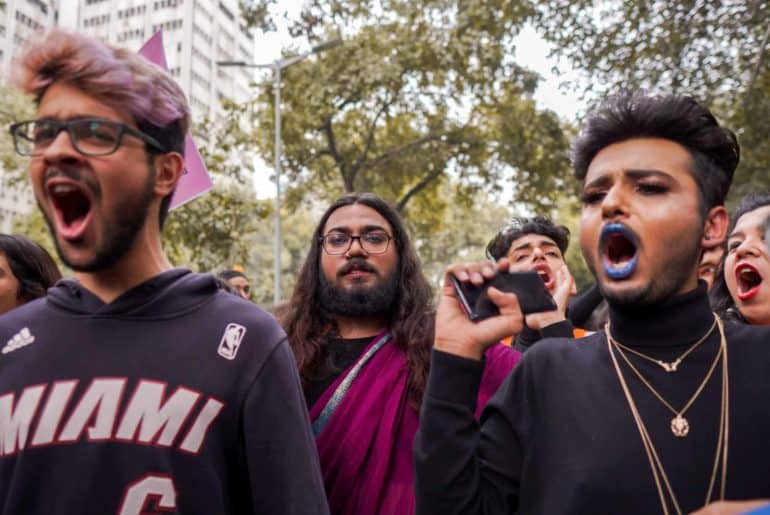The Delhi University Teachers’ Association (DUTA) organised a massive protest on December 4 and December 5 in light of the ad-hoc crisis. The protest was in the form of ‘VC Gherao’ where more than 8000 teachers stormed into the VC (Vice Chancellor) Office. After the protest’s intensity, the circular issued on August 28, 2019 has been amended.
The Delhi University Teachers’ Association showed great distress against the circular issued on 28th August 2019 which led to dismissal of 4500 ad-hoc teachers from their teaching service in the University. On 3rd December, 2019, The DUTA office bearers held a meeting at 6 p.m. wherein they decided that due to lack of communication from Professor Yogesh Tyagi, the Vice Chancellor of the University of Delhi (DU), they will give the administration extra 10 hours to resolve the on-going crisis and inform the DUTA about the same. Failure to do so, the DUTA will go on an indefinite strike, boycotting all invigilation, evaluation and any other official duties from 4th December onwards.
The DUTA collaborated with the staff association of various colleges to completely boycott the exam duties as families of 4500 teachers were at stake. However, DUTA requested the teachers not to stop students from taking exams. The administration along with Vice Chancellor remained silent on the entire issue and provided no relief to the teachers which led to the massive protest on 4th December.
On 4th December 2019, the DUTA began with its ‘indefinite strike’ outside the Vice Chancellor’s Office in the North Campus of the University at 11 a.m. Over 8000 teachers participated in the massive protest in the form of VC Gherao on DUTA’s call in response to ongoing crisis.

Image Caption:Teachers gathered in large number outside the VC Office on the first day of the protest
Image Credits: Anoushka Sharma for DU Beat
Teachers raised slogans such as “Inquilab Zindabaad” and “DU VC shame shame” throughout the day. Teachers also reached out to the masses through the social media to raise awareness about the issue and apprise the students of the cause beyond the exam boycott.
The teachers went through and occupied the Council Hall where Academic Council and Executive Council meetings are held.
“Thank you, VC, for not caring about 4500 Families”, “VC communicate” and “Lodge was stormed in 1984 and 2019” were written all over the walls of the Council Hall to show the dissent of the teachers.


Teachers scribble their dissent on the walls of the VC Office
Several student organisations such as the All India Students’ Union (AISA), Krantikari Yuva Sangathan (KYS) and Student Federation of India (SFI) extended their solidarity to the teachers and even joined the protest. The Akhil Bharatiya Vidhyarthi Parishad (ABVP) led Delhi University Students’ Union (DUSU) also organised protests and condemned the actions of the Vice Chancellor.
At 6:45 P.M. , Many hours after the occupation of the lodge, the VC showed no sign of communication. The police tried to stop the food arrangements made by DUTA for the raging protesters. At 9 P.M., DUTA kept its coordination meeting and decided to keep the strike on with the use of candles and torches.
On December 5, the strike continued outside the VC Lodge with all the teachers protesting relentlessly. Due to the earlier day’s protest, the Administration called the police forces for security. As per sources, the police performed a lathi march on the teachers to stop them from entering the building. Allegedly many of the teachers along with students got injured in the ruckus.

Image Caption: The second day of the protest saw immense barricading and police force deployment as the teachers continued with their demands
Image Credits:Yadu Ushanandani
A meeting was held at 4 p.m. and a circular was released by the Ministry of Human Resource Development in light of the ad-hoc crisis.


The circular released by the Ministry of Human Resource Development, Government of India
At 7 P.M. on the same day, DUTA was promised by the Ministry of Human Resource Development (MHRD) that no teacher would lose their job because of the August 28 letter. Due to the meeting of DUTA executives with the MHRD, a circular was released that proposed immediate changes in criteria and appointment of the academic staff and promised to launch new additional teaching positions under the Economically Weaker Section (EWS) in no less than 30 days.
However, while DUTA celebrated a kind of victory, the DUTA Executive decided to keep a meeting on 6th December 2019 and kept the protest on with their continued demand for the absorption for all teachers.
On 6th December 2019, the extended DUTA Executive Meeting was held at 2 p.m. to review the next course of action. After the meeting ended, Seema Das, Member of the Academic Council quoted, “Friends, we think that we have not gained any substantive achievement on any issue, not even the issue of withdrawal of 28th August letter. Rather, it has now become more confusing and makes it subject to interpretation by the head of institution. Besides, nothing concrete is gained on promotion and other issues. Status quo is maintained. At least some concrete step towards Absorption was what we were looking for out of this unprecedented movement. In such situation, I am doing my best to carry on with this fight along with a few dedicated activists and ad-hoc colleagues. Need support from you all.”
Meanwhile, the strike at the VC Office and the exam duty boycott continues with the request for the absorption for all teachers.
Feature Image Credits: Yadu Ushanandani
Chhavi Bahmba
[email protected]

















